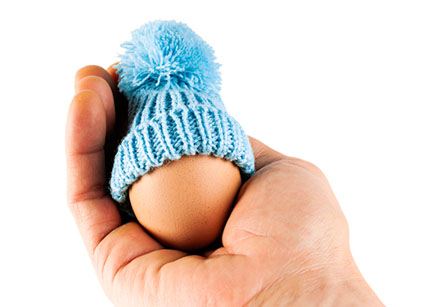Egg Freezing
Introduction
Indications of egg freezing. (oocyte cryopreservation)
There are three main indications for opting egg freezing as a method to preserve fertility.
1. Women having cancer before beginning chemotherapy or radiotherapy. Both these treatments are toxic to the ovary and oocytes. Such women can use egg freezing technique to preserve their fertility to conceive in future.
2. Women undergoing assisted reproductive techniques who do not consider embryo freezing an option for ethical or religious reasons. The required number of eggs for IVF are utilised and remaining unfertilized eggs are frozen.
3. Women who would like to preserve their future ability to have children, as in case of not having a partner yet, or for other personal or medical reasons. Some women postpone childbearing for education or career. Future pregnancy can be ensured by this technique.
4. Also, women with a family history of early menopause have an interest in fertility preservation. With egg freezing, they will have a frozen store of eggs, in the likelihood that their eggs are depleted at an early age.
Iran ranks first in the region in terms of infertility treatment studies

Method:
The process of retrieval of eggs for oocyte cryopreservation is the same as that for in vitro fertilization. Firstly, ovaries are stimulated for ripening of multiple eggs by several weeks of hormonal injections. Secondly, when the eggs are mature, a medication for triggering ovulation is given. And finally, these eggs are removed from the vagina with the help of ultrasound guided fine needle. This procedure is usually performed under intravenous sedation. Eggs can also be removed by a laparoscope. A small incision or cut is made just below the navel and a laparoscope (an instrument designed to look at the abdomen) is inserted into the vagina and a fine, hollow needle is used to remove the eggs.
The eggs are immediately frozen and preserved.
The eggs are thawed and the embryologist injects the sperm directly into the egg with a needle.
The egg must be dehydrated prior to freezing. This is done by using cryoprotectants which replace the water within the egg cell and inhibit the formation of ice crystals.
Eggs (oocytes) can be frozen by two methods. One is by using either a controlled-rate, slow-cooling method and the second, newer flash-freezing process known as vitrification. After freezing, the shell around the egg, the zona pellucida, hardens.
Use of eggs when required:
The eggs are thawed and the embryologist injects the sperm directly into the egg with a needle. This is called as ICSI (Intracytoplasmic Sperm Injection). Thus, the sperm is not allowed to penetrate the egg on its own, thereby increasing chances of success in IVF. This technique is commonly used now.
Thus formed embryo can be transferred and implanted in the uterus with the help of catheter.
Egg freezing and birth defects:
Earlier, it was believed that the rate of birth defects is more with frozen eggs. But now it is proven that there is no increase in chromosomal abnormalities, birth defects, or developmental deficits in the children born from cryopreserved oocytes.
Cost effectiveness:
The cost of egg freezing, (including the embryo transfer) is comparable to that of IVF. Egg storage charges can be several hundred dollars or more per year.
Health risks:
Mostly this technique is safe but a few points are worth mentioning
1. Drugs used in IVF can cause nausea, shortness of breath and vomiting.
2. They can also cause increased fluids in abdomen causing pain in abdomen and swelling.
Success Rate:
The success of the procedure depends upon various factors
1. Age of the women- Younger is the woman; higher are the chances of success as fertility decreases with age.
2. Number of eggs removed: generally ten to twelve eggs are removed.
3. Method and efficacy of egg freezing and preservation
4. Success of fertilization
Almost all the babies born from this method tend to be healthy.
Thus to conclude, the technique of egg freezing is a very effective way to preserve fertility and slower the biological clock of human fertility.